February 27th, 2020 — 1:37am
Catch and Kill by Ronan Farrow
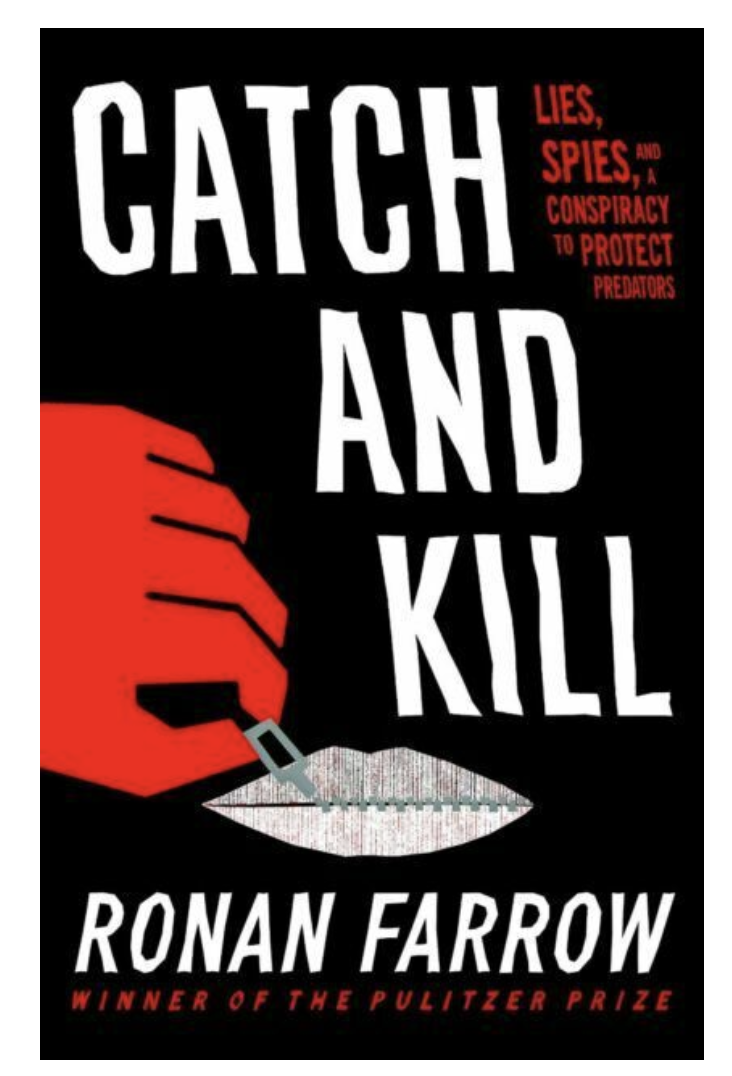 This is the inside story by an investigative journalist who played a major role in exposing the story of the sexual harassment, sexual abuse, assault and rapes by Hollywood Mogul, Harvey Weinstein against a significant number of women who were working as his underlings as well as aspiring actresses. It also tells how many people including network executives at NBC as well as attorneys and even a private investigation agency known as “Black Cube” modeled after the Israeli Mossad which included experienced undercover agents, tried to undermine his reporting. The author gives his firsthand experience describing how several executives at NBC ultimately put the “cabash” on his story which led to him ultimately presenting it in New Yorker magazine.
This is the inside story by an investigative journalist who played a major role in exposing the story of the sexual harassment, sexual abuse, assault and rapes by Hollywood Mogul, Harvey Weinstein against a significant number of women who were working as his underlings as well as aspiring actresses. It also tells how many people including network executives at NBC as well as attorneys and even a private investigation agency known as “Black Cube” modeled after the Israeli Mossad which included experienced undercover agents, tried to undermine his reporting. The author gives his firsthand experience describing how several executives at NBC ultimately put the “cabash” on his story which led to him ultimately presenting it in New Yorker magazine.
By coincidence during that time period that I was reading this book, Harvey Weinstein was on trial and a jury ultimately convicted him of crimes against women which will lead to him being in jail. This made the book extremely relevant. On this journey, we learn that other big names used their positions of authority and fame to abuse women. Matt Lauer, NBC anchor and Les Moonves, the CBS head were two such people.
It cannot escape the reader’s attention that Ronan Farrow, the author of this book, well-known as an esteemed journalist, was also witness to the tragedy of his family where his father, Woody Allen was known to have molested, Ronan’s sister Dylan, daughter of Nia Farrow. These tragic circumstances were touched upon in this book, but not elaborated upon.
While the subject matter of this book was not only interesting, if not, eye opening, the style of writing in my opinion left much to be desired. The reader was introduced to numerous names of network executives, producers, assistant producers, attorneys, public relations personnel, agents, private detectives, editors, assistant editors, fact checkers, anchorman, celebrities and little-known people and, of course, the well-known accusers and the not so well-known accusers. After being briefly introduced to all these people, they were frequently brought up again later in the book by name, without any reminder of who they were and their significance. In my opinion, this made the book a difficult one to follow although I do appreciate value of bringing all these people and the story to the public view.
Comment » | O - Other - Specify, Social
March 17th, 2018 — 5:59pm
And Then All Hell Broke Loose: Two Decades in the Middle East by Richard Engel
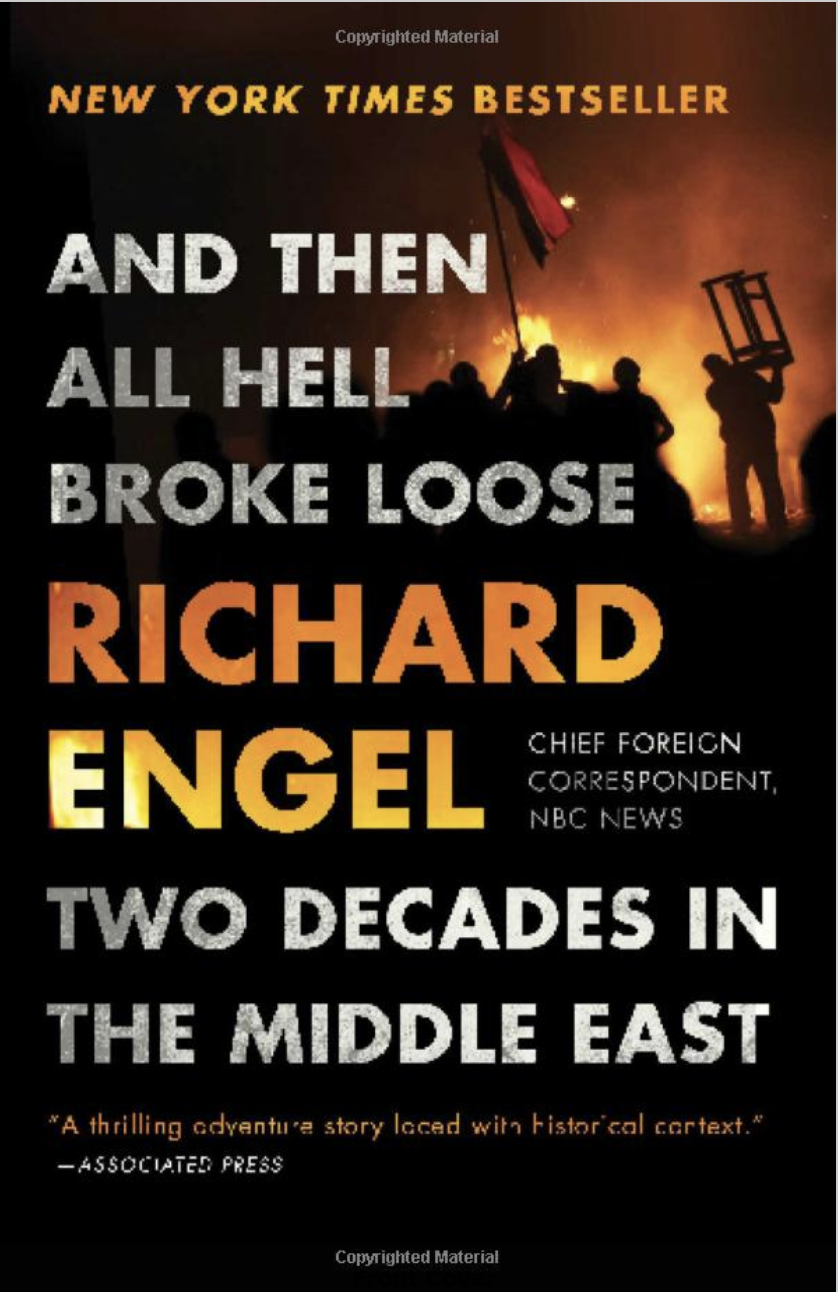 I have always enjoyed Richard Engel’s television reports from the Middle East. He comes across as a brave, dedicated, knowledgeable reporter. More recently, I have seen him on NBC with a helmet and flak jacket reporting riots and in the middle of dangerous situations. Therefore, it was quite interesting to read about his determination as a young man to be a reporter and why he chose to specialize in the Middle East. He certainly was ambitious, but he was willing to put in hard work and to climb a ladder going from a freelancer to NBC’s go-to person in the Mid East. His adventures included a situation where he was captured and held prisoner. The book had the makings of a interesting movie or documentary.
I have always enjoyed Richard Engel’s television reports from the Middle East. He comes across as a brave, dedicated, knowledgeable reporter. More recently, I have seen him on NBC with a helmet and flak jacket reporting riots and in the middle of dangerous situations. Therefore, it was quite interesting to read about his determination as a young man to be a reporter and why he chose to specialize in the Middle East. He certainly was ambitious, but he was willing to put in hard work and to climb a ladder going from a freelancer to NBC’s go-to person in the Mid East. His adventures included a situation where he was captured and held prisoner. The book had the makings of a interesting movie or documentary.
The history of this area of the world has always seemed quite complicated to me. As part of this book, Engel makes an effort to trace the history of this part of the world back to ancient times. He makes a professional attempt to describe the history dating back to Mohammed and even earlier. He explains the differences between various groups and sects, such as Shiites and Sunnis and goes into great detail about the various leaders (mostly not elected) who were strong in the various countries and describes how they have impacted the history of this region. He tells how each one came to power as well as why they were able to stay in power or were toppled by opponents, sometimes with or without the help of the United States or other outside countries. I wish I could say that I am greatly enlightened by these descriptions and that I now have a coherent understanding of the history and the various power of factions in the Mid East but unfortunately, that would not be true. While Engel is clearly a knowledgeable scholar of the history and of the intricacies, they still blend together in my mind although I have not given up on trying to master an understanding of them.
While I am sure Engel would disagree, I did feel that he was somewhat unsympathetic to Israel. He noted at one point when he and his young first wife lived in Jerusalem, most of the Americans that he met there “were deeply involved in their temple groups.” He went on to say that he was “never able to break into their close-knit communities.” Also, in describing the Israeli ministers at all level, he noted, “I never saw such a well-oiled public relations machine.” When describing life under the Oslo Agreement, for the Palestinians living in the West Bank, he emphasized how blatantly unfair it was to the Palestinians, “it was a strange system which Palestinians had different rights depending where they lived.” He made the statement that “Many Israelis then and now, scarcely saw the Palestinians as human.” During the confrontation between Israeli soldiers and Palestinians throwing rocks at them, he noted that the Israelis shot rubber bullets, which he then added, “could cause fatal hematomas” as if the rocks thrown at the soldiers were not dangerous. Furthermore, in his description of the Israeli-Lebanon conflict, I thought he was negative towards Israel. I have never doubted Engel’s attempts at being an objective reporter, but as noted, I did think he was unfairly unsympathetic to Israel.
Despite my feelings about his one-sided view of Israel and my own difficulty in grasping a substantial piece of the history lessons he tried to give, I found this book a very a interesting and worthwhile read from a familiar television reporter for whom I have great admiration.
Please leave any comments below
To purchase a copy of this book on Amazon, please click here
Comment » | AM - Autobiography or Memoir, HI - History, P - Political
December 1st, 2013 — 1:13am
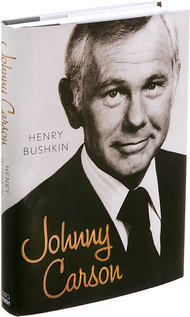 Johnny Carson by Henry Bushkin Imagine that you have a good friend with whom you visit on a regular basis for more than 15 years . He died several years ago and you learn that someone who knew him very well has just written a book about him. You probably would be very drawn to want to read that book as was I when this book came out about Johnny Carson. I would periodically watch the Tonite Show, which he hosted for thirty years between 1962 and 1992. The book was written by Henry Bushkin, who Carson once described as his best friend. Bushkin met Carson in 1970 when he was interviewed by him and hired as his personal attorney when Bushkin was just a few years out of law school. As I got into the book I developed the uncomfortable feeling that not only was the author not being a very loyal friend by revealing Carson’s personal life and depicting him as mostly not a very nice guy, but that he also was breaching his code of ethics as a lawyer by discussing things that were told to him in his role as Carson’s attorney. (I understand that lawyers may debate the issue of whether such lawyer client privilege exists after death.) For example very early in his tenure as Carson’s lawyer he accompanied him and a small raiding party that broke into Carson’s second wife’s apartment in which she was living while they were separated. She wasn’t there at the time and the purpose of the break-in was to discover evidence that she was having an affair which they did find. Bushkin was ready to answer the police if they were caught by claiming that it was Johnny’s apartment since he was providing all his wife’s financial support at that time. There was a time during Carson’s run with NBC when his contract was due to run out and he was being courted by ABC. All the behind the scenes secret details how Bushkin and Carson led ABC on to think that they might go with them while using the inducements being offered to them by ABC to extract more from NBC were revealed. Johnny’s marital infidelities were also freely discussed with a hint that Bushkin was also cheating on his own wife. In fact, Bushkin’s explanation for his own wife leaving him was because she couldn’t tolerate his putting Carson over her as he would be frequently away in the evening as well as out of town whenever Carson traveled and needed him. Perhaps the most remarkable aspect of this book was the depiction of Johnny Carson’s character as a superficial man who had very little capacity to care about other people. He was shown to have no meaningful relationship with his sons when they were children or adults. When Joan Rivers, who he invited to be a substitute host for him on his show many times, accepted a deal to have her own show on another network opposite his show, he never spoke with her again. His need to be praised and adored by others, as well as his questionable honesty, was illustrated by how he played tennis. Bushkin who apparently was an excellent tennis player was expected to play tennis with Carson, who loved the game, Bushkin noted that Carson would frequently call line shots in his favor even when they were not and would accept (and apparently expect) Bushkin calling them in Carson’s favor even when they were not. Bushkin attributed Carson’s inability to have genuine caring relationships to be related to his mother Ruth who was described as a nasty person. It was clear that Bushkin became a very wealthy man himself as result of his association with Carson and participation in some of the business deals that he helped set up for his boss. Carson eventually fired Bushkin in 1988 because he felt that he was not being totally loyal to him and did not put Carson’s interest above his own. Therefore it should be of little surprise as with this book Carson’s “good friend” and attorney appears to care little about preserving his legacy and reputation as the warm likeable guy that so many people spent so many evenings with as they enjoyed The Tonite Show. The end product which he produced is really quite superficial and probably doesn’t “tell all” but certainly “belittles much” about Johnny . Don’t reward the author as I did by purchasing this book. If you must read it, take it out from the library.
Johnny Carson by Henry Bushkin Imagine that you have a good friend with whom you visit on a regular basis for more than 15 years . He died several years ago and you learn that someone who knew him very well has just written a book about him. You probably would be very drawn to want to read that book as was I when this book came out about Johnny Carson. I would periodically watch the Tonite Show, which he hosted for thirty years between 1962 and 1992. The book was written by Henry Bushkin, who Carson once described as his best friend. Bushkin met Carson in 1970 when he was interviewed by him and hired as his personal attorney when Bushkin was just a few years out of law school. As I got into the book I developed the uncomfortable feeling that not only was the author not being a very loyal friend by revealing Carson’s personal life and depicting him as mostly not a very nice guy, but that he also was breaching his code of ethics as a lawyer by discussing things that were told to him in his role as Carson’s attorney. (I understand that lawyers may debate the issue of whether such lawyer client privilege exists after death.) For example very early in his tenure as Carson’s lawyer he accompanied him and a small raiding party that broke into Carson’s second wife’s apartment in which she was living while they were separated. She wasn’t there at the time and the purpose of the break-in was to discover evidence that she was having an affair which they did find. Bushkin was ready to answer the police if they were caught by claiming that it was Johnny’s apartment since he was providing all his wife’s financial support at that time. There was a time during Carson’s run with NBC when his contract was due to run out and he was being courted by ABC. All the behind the scenes secret details how Bushkin and Carson led ABC on to think that they might go with them while using the inducements being offered to them by ABC to extract more from NBC were revealed. Johnny’s marital infidelities were also freely discussed with a hint that Bushkin was also cheating on his own wife. In fact, Bushkin’s explanation for his own wife leaving him was because she couldn’t tolerate his putting Carson over her as he would be frequently away in the evening as well as out of town whenever Carson traveled and needed him. Perhaps the most remarkable aspect of this book was the depiction of Johnny Carson’s character as a superficial man who had very little capacity to care about other people. He was shown to have no meaningful relationship with his sons when they were children or adults. When Joan Rivers, who he invited to be a substitute host for him on his show many times, accepted a deal to have her own show on another network opposite his show, he never spoke with her again. His need to be praised and adored by others, as well as his questionable honesty, was illustrated by how he played tennis. Bushkin who apparently was an excellent tennis player was expected to play tennis with Carson, who loved the game, Bushkin noted that Carson would frequently call line shots in his favor even when they were not and would accept (and apparently expect) Bushkin calling them in Carson’s favor even when they were not. Bushkin attributed Carson’s inability to have genuine caring relationships to be related to his mother Ruth who was described as a nasty person. It was clear that Bushkin became a very wealthy man himself as result of his association with Carson and participation in some of the business deals that he helped set up for his boss. Carson eventually fired Bushkin in 1988 because he felt that he was not being totally loyal to him and did not put Carson’s interest above his own. Therefore it should be of little surprise as with this book Carson’s “good friend” and attorney appears to care little about preserving his legacy and reputation as the warm likeable guy that so many people spent so many evenings with as they enjoyed The Tonite Show. The end product which he produced is really quite superficial and probably doesn’t “tell all” but certainly “belittles much” about Johnny . Don’t reward the author as I did by purchasing this book. If you must read it, take it out from the library.
Comment » | B - Biography
 This is the inside story by an investigative journalist who played a major role in exposing the story of the sexual harassment, sexual abuse, assault and rapes by Hollywood Mogul, Harvey Weinstein against a significant number of women who were working as his underlings as well as aspiring actresses. It also tells how many people including network executives at NBC as well as attorneys and even a private investigation agency known as “Black Cube” modeled after the Israeli Mossad which included experienced undercover agents, tried to undermine his reporting. The author gives his firsthand experience describing how several executives at NBC ultimately put the “cabash” on his story which led to him ultimately presenting it in New Yorker magazine.
This is the inside story by an investigative journalist who played a major role in exposing the story of the sexual harassment, sexual abuse, assault and rapes by Hollywood Mogul, Harvey Weinstein against a significant number of women who were working as his underlings as well as aspiring actresses. It also tells how many people including network executives at NBC as well as attorneys and even a private investigation agency known as “Black Cube” modeled after the Israeli Mossad which included experienced undercover agents, tried to undermine his reporting. The author gives his firsthand experience describing how several executives at NBC ultimately put the “cabash” on his story which led to him ultimately presenting it in New Yorker magazine.
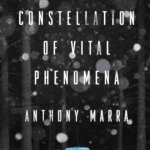
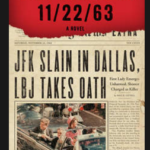
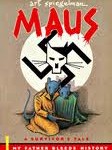
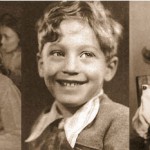

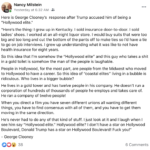

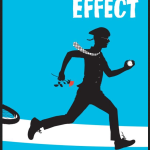
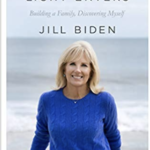
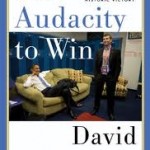



 I have always enjoyed Richard Engel’s television reports from the Middle East. He comes across as a brave, dedicated, knowledgeable reporter. More recently, I have seen him on NBC with a helmet and flak jacket reporting riots and in the middle of dangerous situations. Therefore, it was quite interesting to read about his determination as a young man to be a reporter and why he chose to specialize in the Middle East. He certainly was ambitious, but he was willing to put in hard work and to climb a ladder going from a freelancer to NBC’s go-to person in the Mid East. His adventures included a situation where he was captured and held prisoner. The book had the makings of a interesting movie or documentary.
I have always enjoyed Richard Engel’s television reports from the Middle East. He comes across as a brave, dedicated, knowledgeable reporter. More recently, I have seen him on NBC with a helmet and flak jacket reporting riots and in the middle of dangerous situations. Therefore, it was quite interesting to read about his determination as a young man to be a reporter and why he chose to specialize in the Middle East. He certainly was ambitious, but he was willing to put in hard work and to climb a ladder going from a freelancer to NBC’s go-to person in the Mid East. His adventures included a situation where he was captured and held prisoner. The book had the makings of a interesting movie or documentary.